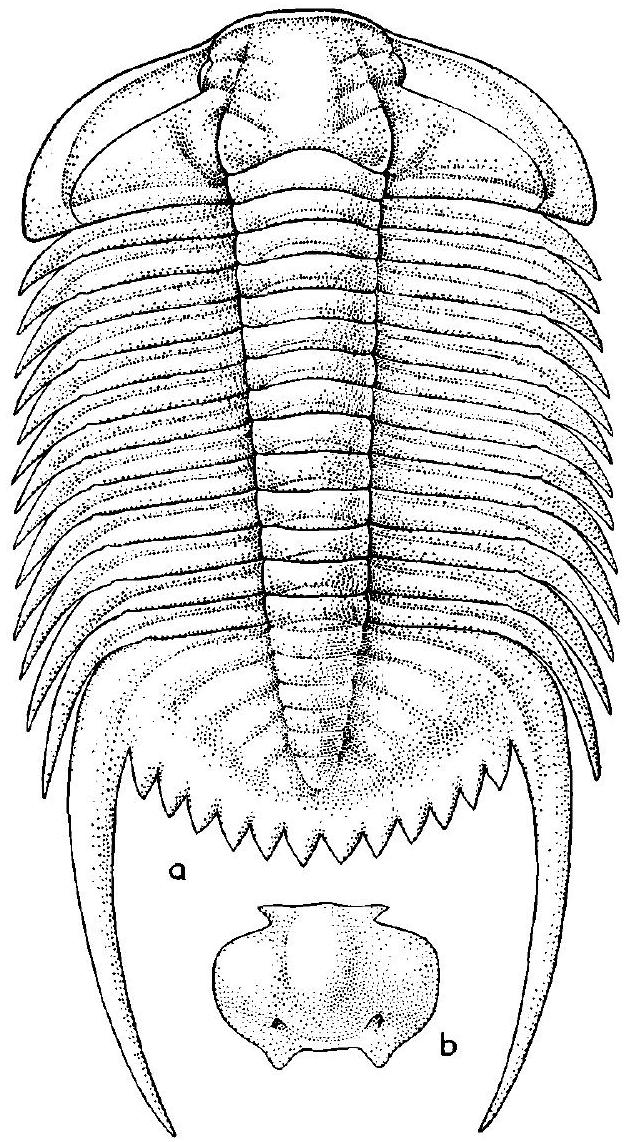Welcome to the Treatise on Invertebrate Paleontology!
Please enter a genera name to retrieve more information.

Drepanura
Classification
Phylum:
Arthropoda
Subphylum:
Trilobitomorpha
Class:
Trilobita
Order:
Ptychopariida
Suborder:
Ptychopariina
Superfamily:
Damesellacea
Family:
Damesellidea
Subfamily:
Drepanurinae
Formal Genus Name and Reference:
Drepanura BERGERON, 1899
Type Species:
D. premesnili
Images
(Click to enlarge in a new window)
Fig. 235. *D. premesnili, Kushanian, China(Shantung), a, exoskel., x1.5, b, hypostoma, x1.5 (419)."
Synonyms
Geographic Distribution
E.Asia, W.Eu
Age Range
Beginning Stage in Treatise Usage:
Up.M.Cam.
Beginning International Stage:
Drumian
Fraction Up In Beginning Stage:
0
Beginning Date:
504.5
Ending Stage in Treatise Usage:
Low.Upper Cambrian
Ending International Stage:
Jiangshanian
Fraction Up In Ending Stage:
25
Ending Date:
493.4
Description
Glabella broad-based tapering, front nearly straight, with 2 pairs of short deep lateral furrows, no preglabellar field, shallow border furrow running into preglabellar furrow, anterior border rimlike, eyes slightly anterior to center of glabella, faint diagonal eye ridges, fixigenae with palpebral areas 0.3 of glabellar width or slightly less, posterior areas of variable width (exsag.), length (tr.) equal to occipital ring, librigenae with medium-length genal spines or blunt genal angles. Hypostoma subquadrate, with small anterior wings, oval central lobe, semicircular posterior lobe wide at sides with a pair of posterior projections, bearing 2 deep pits joined by furrow. Thorax with 13 segments. Pygidium semicircular, 3 to 5 axial rings and terminal, pleural fields moderately convex, about equal to axis in width, with 5 pleurae, anterior pair enlarged, 5 pleural furrows, anterior pair continuing into spines, no border furrow, border very narrow, with 7 to 9 marginal spines, anterior pair enlarged. Surface granulose.
References
Museum or Author Information
Classification
Phylum:
Arthropoda
Subphylum:
Trilobitomorpha
Class:
Trilobita
Order:
Ptychopariida
Suborder:
Ptychopariina
Superfamily:
Damesellacea
Family:
Damesellidea
Subfamily:
Drepanurinae
Formal Genus Name and Reference:
Drepanura BERGERON, 1899
Type Species:
D. premesnili
Images
(Click to enlarge in a new window)
Fig. 235. *D. premesnili, Kushanian, China(Shantung), a, exoskel., x1.5, b, hypostoma, x1.5 (419)."
Synonyms
Geographic Distribution
E.Asia, W.Eu
Age Range
Beginning Stage in Treatise Usage:
Up.M.Cam.
Beginning International Stage:
Drumian
Fraction Up In Beginning Stage:
0
Beginning Date:
504.5
Ending Stage in Treatise Usage:
Low.Upper Cambrian
Ending International Stage:
Jiangshanian
Fraction Up In Ending Stage:
25
Ending Date:
493.4
Description
Glabella broad-based tapering, front nearly straight, with 2 pairs of short deep lateral furrows, no preglabellar field, shallow border furrow running into preglabellar furrow, anterior border rimlike, eyes slightly anterior to center of glabella, faint diagonal eye ridges, fixigenae with palpebral areas 0.3 of glabellar width or slightly less, posterior areas of variable width (exsag.), length (tr.) equal to occipital ring, librigenae with medium-length genal spines or blunt genal angles. Hypostoma subquadrate, with small anterior wings, oval central lobe, semicircular posterior lobe wide at sides with a pair of posterior projections, bearing 2 deep pits joined by furrow. Thorax with 13 segments. Pygidium semicircular, 3 to 5 axial rings and terminal, pleural fields moderately convex, about equal to axis in width, with 5 pleurae, anterior pair enlarged, 5 pleural furrows, anterior pair continuing into spines, no border furrow, border very narrow, with 7 to 9 marginal spines, anterior pair enlarged. Surface granulose.
